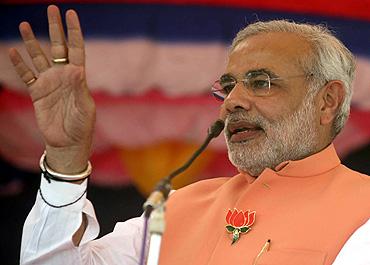
Modi's fast has failed to put even a paper-thin moderate or secular gloss on his image. But he has succeeded in shifting the BJP politically to the far right, decisively and firmly, says Praful Bidwai.
Through his contrived sadbhavana mission and outlandish three-day fast, Gujarat Chief Minister Narendra 'Milosevic' Modi staged a grotesquely fraudulent act in ugly political theatre, which he hoped would catapult him to the apex of the Bharatiya Janata Party and make him the topmost contender as the prime ministerial nominee of the National Democratic Alliance.
But besides consolidating his image as a Hindutva hriday samrat, Modi's manoeuvres may achieve little. Yet they will inflict a heavy burden on the BJP by isolating it from its potential allies.
Modi's shenanigans will certainly do nothing to make him acceptable to the Muslims, who suffered Independent India's worst state-organised butchery under him in 2002. The presence of skull-capped men and burqa-clad women at his fast means nothing.
Modi didn't express remorse at the violence or signal moderation. He came through as an arrogant, duplicitous and hubris-driven politician bent on further humiliating Muslims. His fast wasn't about sadbhavana (goodwill or harmony), but about hyping himself up as a politician.
...
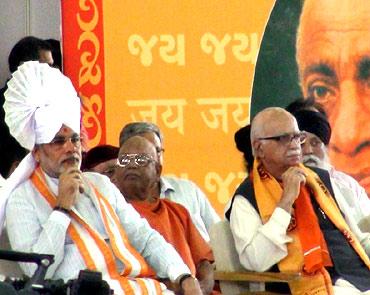
Yet much of the BJP's senior leadership danced attendance upon Modi. This encouraged him to flex his muscles. He even belittled his former mentor L K Advani by making him sit in a smaller chair than his own at the venue of the fast, thus symbolically challenging conservative notions of hierarchy.
Symbols apart, one of Modi's main objective was to undercut Advani's bid to regain his pre-eminence in the BJP through his unilaterally announced rath yatra, which is designed to politicise religious sentiment through the image of a mythical warrior riding a Bollywoood-style version of an ancient chariot.
Modi has queered the yatra's pitch and forced a shift in its starting-point to Bihar. Since then, the RSS has further snubbed Advani.
Two other motives inspired Modi: first, to celebrate the recent Supreme Court ruling in the Zakia Jafri petition as a 'clean chit' for him in the Gulburg Society massacre; and second, to use the fast, a tactic perfected by Anna Hazare, to show that the opposition space in politics isn't entirely occupied by civil society; the BJP still retains its relevance.
However, the Supreme Court by no means exonerated Modi or the Special Investigation Team's report which holds that there is no prosecutable evidence against him and 61 others named by Jafri. Although the court sent the case to a trial court in Gujarat, it directed it to examine that report, as well as the comments made on it by amicus curiae (friend of the court) Raju Ramachandran, and to give the petitioners a hearing.
...
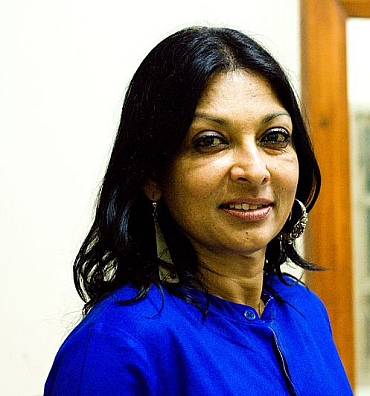
The trial court can proceed against the accused even though the SIT didn't file a charge-sheet against them. Of course, how the court acts within Gujarat's vitiated political climate remains an open question, but it cannot simply bury the case or accept a closure report without hearing the petitioners, and summoning witnesses if necessary.
Meanwhile, Modi's credibility has been further damaged by the disclosure by dancer-activist Mallika Sarabhai, based on an affidavit filed by former top police official R B Sreekumar, that his government tried to scuttle her writ petition for prosecuting him for the violence by paying a Rs 10-lakh bribe to her lawyer.
This showed that the Modi regime could stoop to the rock bottom to suppress efforts to bring the culprits of the 2002 communal violence to book.
The Modi government undermined its sadbhavana platform by cracking down on Sarabhai, Jan Sangharsh Morcha activist-lawyer Mukul Sinha -- who has done outstanding work in exposing the cover-up -- and others, for attempting a symbolic protest fast.
This fast would have carried much more credibility than Congress leader Shankersinh Vaghela's own hunger-strike, not least because of his past association and numerous compromises with the Sangh Parivar. Preventing the activists' fast is one more black-mark against Modi.
...
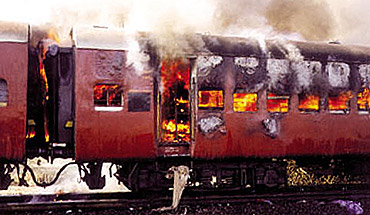
As for the objective of pressing the BJP's pre-eminent claim to the opposition space, Modi's fast was a laughable parody of the Anna Hazare original: pointless, artificial, insincere, cheaply self-justificatory, and patently lacking in introspection.
The farcical gimmick drew ridicule from the BJP's most valuable ally, the Janata Dal-United, with whom it shares power in Bihar.
The support extended to the fast by the Akali Dal, which is widely expected to lose the coming elections in Punjab and get marginalised, and the AIADMK, which isn't even remotely considering allying with the BJP, doesn't mean much.
Modi hasn't overcome even an iota of the stigma he earned by presiding over the anti-Muslim pogrom of 2002. It is of course utterly shameful that he hasn't been criminally prosecuted, and worse, even politically punished, for his role in falsely communalising the Godhra train fire, and systematically organising and colluding in the ensuing violence.
India's entire political class failed to compel the ruling NDA to dismiss the Modi government in March 2002 for manifestly violating the fundamental right to life of citizens and plotting the massacre of more than 1,000 people.
...
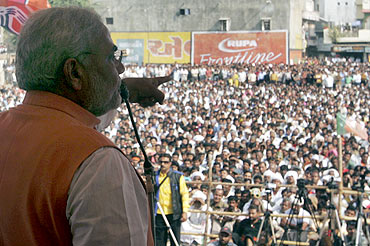
Arguably, had the secular opposition, including the Congress's Sonia Gandhi, the Communist parties' Harkrishan Singh Surjit, Jyoti Basu and A B Bardhan, and centrist leaders like Lalu Prasad, Mulayam Singh Yadav and others, insisted on its dismissal through a sustained agitation, the NDA might have had no choice but to impose President's Rule.
Similarly, assembly elections were held in December 2002 despite Gujarat's communally charged atmosphere, the terrorising and disenfrachisement of a whole community, and the near-total absence of rehabilitation of the violence-affected.
After rightly raising objections initially, the Election Commission unfortunately agreed to hold elections, citing a questionable legal precedent. Modi cynically capitalised on Hindutva hubris and won even as the Congress adopted a soft-Hindutva line, reducing itself to the BJP's 'B Team'.
Instead of cooling his heels in prison, Modi continues to occupy the seat of power in Gandhinagar. He has methodically covered up his crimes even as his police have brutalised people and intimidated witnesses.
His presence has been poisonous, not just in Gujarat. No one has brought as much international disrepute to India. No other Indian chief minister has been denied a visa in numerous countries for complicity in gross human right violations.
...
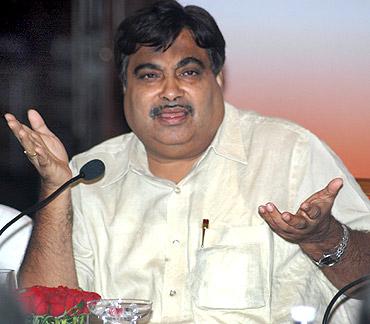
Modi has ruled Gujarat despotically, and pampered big business by offering it huge tax breaks at the expense of public welfare and human development. Gujarat has stagnant or falling indices in health, education and gender equality:
Seventy four percent of Gujarat's women and 46 percent of its children are anaemic. The state's sex-ratio is an abysmal 487:1000 in the 0-4 age-group and 571 in the 5-9 age-group (national averages, 515 and 632 respectively). Gujarat's health indices are barely higher than Orissa's. In social sector spending as a proportion of public expenditure, Gujarat ranks a lowly 19 among 21 major states.
Modi's fast has failed to put even a paper-thin moderate or secular gloss on his image. But he has succeeded in shifting the BJP politically to the far right, decisively and firmly. Not only has he imposed his will upon the party; he has drawn praise from such unlikely sources as Sushma Swaraj, a party rival.
Even Advani now says Mr Modi can handle "any responsibility", presumably including the nation's top job.
Modi's ambition is to win the Gujarat elections due next year, probably by advancing their date, and then become BJP president when Nitin Gadkari's term ends in December 2012. This would give him a definite edge over other "second generation" leaders like Swaraj, Arun Jaitley, M Venkaiah Naidu and Rajnath Singh.
...
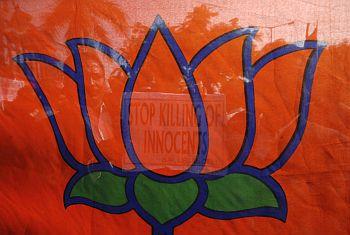
He then hopes that with the backing of powerful business lobbies, he will become the NDA's prime ministerial candidate.
However, such a pre-poll arrangement can be safely ruled out. The JD-U will certainly oppose it. It's also extremely unlikely that former NDA constituents like the Biju Janata Dal and Telugu Desam will return to the alliance under Modi's leadership.
It's only in the unlikely event of the BJP winning 200-plus Lok Sabha seats that a post-election alliance will emerge. But it's difficult to see how the BJP can increase its tally by 84 seats or over 70 percent (from the present 116) unless it does miraculously well in Uttar Pradesh, where it's currently Number 4.
Ironically, by shifting the BJP rightwards, Modi will have narrowed its base and electoral appeal. A hardline Hindutva party will massively and irrevocably repulse the religious minorities, which form one-sixth of the national vote, or roughly one-half of what's needed for a party to win a national election. That's a recipe for losing elections.
Narrowing of the BJP's base will probably open up new political spaces while weakening the trend towards bipolarism. This would offer interesting opportunities to secular Left-of-Centre forces, admittedly amidst some endemic national-level instability.
The BJP could soon find that Modi, with his insufferable arrogance, megalomania and obnoxious ultra-individualism, is more a liability than an asset both for itself and its allies. It stands warned.